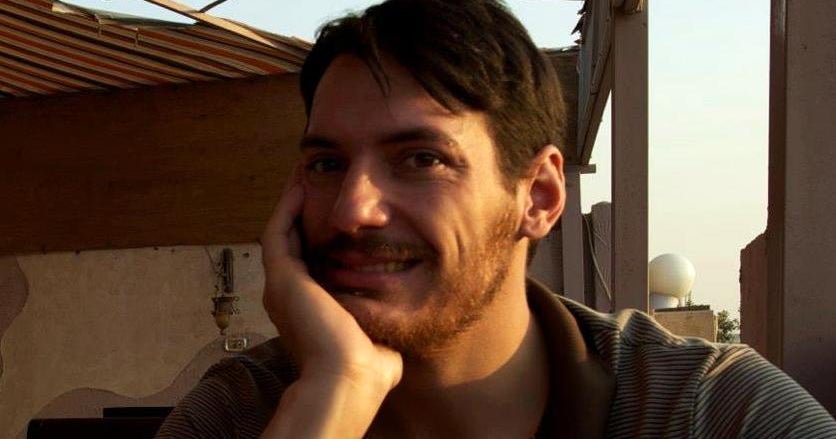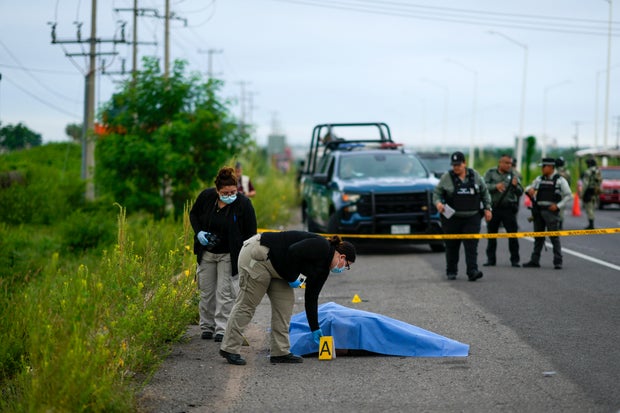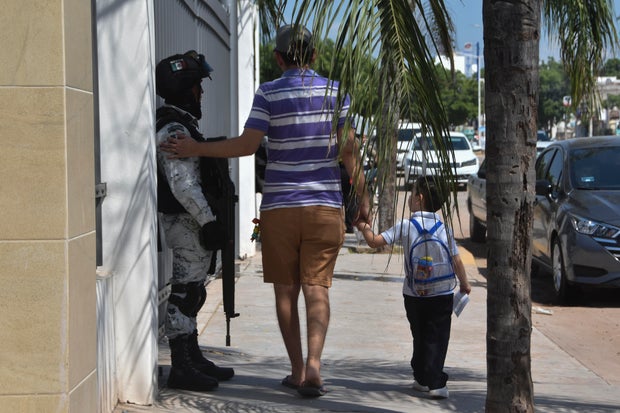CBS News
Why cellphone chats have become death sentences in cartel stronghold in Mexico

Cellphone chats have become death sentences in the continuing, bloody factional war inside Mexico’s Sinaloa drug cartel.
Cartel gunmen stop youths on the street or in their cars and demand their phones. If they find a contact who’s a member of a rival faction, a chat with a wrong word or a photo with the wrong person, the phone owner is dead.
Then, they’ll go after everyone on that person’s contact list, forming a potential chain of kidnapping, torture and death. That has left residents of Culiacan, the capital of Sinaloa state, afraid to even leave home at night, much less visit towns a few miles away where many have weekend retreats.
“You can’t go five minutes out of the city, … not even in daylight,” said Ismael Bojórquez, a veteran journalist in Culiacan. “Why? Because the narcos have set up roadblocks and they stop you and search through your cellphone.”
And it’s not just your own chats: If a person is traveling in a car with others, one bad contact or chat can get the whole group kidnapped.
That’s what happened to the son of a local news photographer. The 20-year-old was stopped with two other youths and something was found on one of their phones; all three disappeared. Calls were made and the photographer’s son was finally released, but the other two were never seen again.
Eduardo Verdugo / AP
Residents of Culiacan had long been accustomed to a day or two of violence once in a while. The presence of the Sinaloa cartel is woven into everyday life there, and people knew to stay indoors when they saw the convoys of double-cab pickups racing through the streets.
But never have they seen the solid month of fighting that broke out Sept. 9 between factions of the Sinaloa cartel after drug lords Ismael “El Mayo” Zambada and Joaquín Guzmán López were apprehended in the United States after flying there in a small plane on July 25.
Zambada claimed he was kidnapped and forced aboard the plane by Guzmán López, causing a violent battle between Zambada’s faction and the “Chapitos” group led by the sons of imprisoned drug lord Joaquin “El Chapo” Guzmán. “El Chapo” is serving a life sentence in a maximum security prison in Colorado after being convicted in 2019 on charges including drug trafficking, money laundering and weapons-related offenses.
Zambada pleaded not guilty last month in New York in a drug trafficking case that accuses him of engaging in murder plots and ordering torture.
New generation of drug lords and a “chain of hunting”
Residents of Culiacan are mourning their old lives, when the wheels of the local economy were greased by cartel wealth but civilians seldom suffered – unless they cut off the wrong pickup truck in traffic.
But recently, bodies have appeared across Culiacan, often left slung out on the streets or in cars with either sombreros on their heads or pizza slices or boxes pegged onto them with knives. The pizzas and sombreros have become informal symbols for the warring cartel factions, underscoring the brutality of their warfare.
Juan Carlos Ayala, an academic who studies the anthropology of the drug trade at the Autonomous University of Sinaloa, said that following the arrests of Guzmán López and Zambada in July, a new generation of younger, more flashy and cosmopolitan drug lords have taken over.
They fight with extreme violence, kidnapping and cellphone tracking – not the old kind of handshake deals their elders used alongside shootouts to settle matters.
“There is a new generation of leaders of drugs and organized crime here, that has other strategies,” Ayala said. “They see that the tactic of shootouts hasn’t worked for them, so they go for kidnapping.”
“They catch one person, and he has messages from the rival group,” said Ayala. “So they go after him to squeeze more information, and that starts a chain of hunting, to catch the enemy.”
The new tactics are reflected in the huge wave of armed carjackings in and around Culiacan. Cartel gunmen used to steal the SUVs and pickups they favor for use in cartel convoys; but now they focus on stealing smaller sedans.
They use these to go undetected in their silent, deadly kidnappings.
Often, the first a driver knows is when a passing car tosses out a spray of bent nails to puncture his tires. Vehicles pull up front and rear to cut him off. The driver is bundled into another car. All that is left for neighbors to find is a car with burst tires, the doors open, the engine running, in the middle of the street.
/ AP
The State Council on Public Safety, a civic group, estimates that in the past month there have been an average of six killings and seven disappearances or kidnappings in and around the city every day. The group said about 200 families have fled their homes in outlying communities because of the violence.
Culiacan is no stranger to violence — a shooting broke out across the city in October 2019 when soldiers mounted a failed attempt to arrest another of Chapo Guzmán’s sons, Ovidio. Fourteen people were killed that day.
A few days later, civic activist Estefanía López arranged a peace march and 4,000 residents turned out for it. When she tried to do something similar this year, she could get only about 1,500 people to attend a similar demonstration.
“We got a lot of messages beforehand from a lot of people who said they wanted to join and march, to support the cause, but who were afraid to come,” López said.
There’s reason to be afraid: Last week, gunmen burst into a Culiacan hospital to kill a patient previously wounded by gunshots. In a town north of Culiacan, drivers were astonished to see a military helicopter seeking to corral four gunmen in helmets and tactical vests just yards from a highway; the gunmen were shooting back at the chopper.
The government’s response to all this has been to blame the United States for stirring up trouble by allowing the drug lords to turn themselves in, and to send in hundreds of army troops.
But irregular urban combat in the heart of a city of 1 million inhabitants – against a cartel that has lots of .50-caliber sniper rifles and machine guns – is not the army’s specialty.
Squads of soldiers went into a luxury apartment complex in the city’s center to detain a suspect and they wound up shooting to death a young lawyer who was merely a bystander.
López, the peace activist, has been asking for soldiers and police to be posted outside schools, so children can return to classes – most are currently taking classes online because their parents judge it too dangerous to take them to school.
But police can’t solve the problem: Culiacan’s entire municipal force has been temporarily disarmed by soldiers to check their guns, something that’s been done in the past when the army suspects policemen are working for drug cartels.
The local army commander recently acknowledged that it’s up to the cartel factions – not authorities – when the violence will stop.
“In Culiacan, there is not even faith anymore that we will be safe, with police or soldiers,” López said, noting that that has had a clear effect on daily life and the economy. “A lot of businesses, restaurants and nightclubs have been closed for the past month.”
Laura Guzmán, the leader of the local restaurant chamber, said about 180 businesses in Culiacan have closed, permanently or temporarily, since Sept. 9 and almost 2,000 jobs have been lost.
Local businesses tried to organize evening “tardeadas” – long afternoons – for residents who were afraid to go out after dark, but they didn’t draw enough customers.
“Young people are not interested in going out right now,” Guzmán said.
For those looking to get away from the violence temporarily, the seaside resort of Mazatlan used to be only 2½ hours away by car. But that’s not an option since last month when cartel gunmen hijacked passenger buses, forced the tourists off and burned the vehicles to block the road to Mazatlan.
That leaves just one option, and one only open to some.
“Those who have the economic resources get out of the city by airplane to take a break,” Guzmán said.
CBS News
Biden’s top hostage envoy Roger Carstens in Syria to ask for help in finding Austin Tice

Roger Carstens, the Biden administration’s top official for freeing Americans held overseas, on Friday arrived in Damascus, Syria, for a high-risk mission: making the first known face-to-face contact with the caretaker government and asking for help finding missing American journalist Austin Tice.
Tice was kidnapped in Syria 12 years ago during the civil war and brutal reign of now-deposed Syrian dictator Bashar al-Assad. For years, U.S. officials have said they do not know with certainty whether Tice is still alive, where he is being held or by whom.
The State Department’s top diplomat for the Middle East, Barbara Leaf, assistant secretary of state for Near Eastern Affairs, accompanied Carstens to Damascus as a gesture of broader outreach to Hay’at Tahrir al-Sham, known as HTS, the rebel group that recently overthrew Assad’s regime and is emerging as a leading power.
Near East Senior Adviser Daniel Rubinstein was also with the delegation. They are the first American diplomats to visit Damascus in over a decade, according to a State Department spokesperson.
They plan to meet with HTS representatives to discuss transition principles endorsed by the U.S. and regional partners in Aqaba, Jordan, the spokesperson said. Secretary of State Antony Blinken traveled to Aqaba last week to meet with Middle East leaders and discuss the situation in Syria.
While finding and freeing Tice and other American citizens who disappeared under the Assad regime is the ultimate goal, U.S. officials are downplaying expectations of a breakthrough on this trip. Multiple sources told CBS News that Carstens and Leaf’s intent is to convey U.S. interests to senior HTS leaders, and learn anything they can about Tice.
Rubinstein will lead the U.S. diplomacy in Syria, engaging directly with the Syrian people and key parties in Syria, the State Department spokesperson added.
Diplomatic outreach to HTS comes in a volatile, war-torn region at an uncertain moment. Two sources even compared the potential danger to the expeditionary diplomacy practiced by the late U.S. Ambassador Christopher Stevens, who led outreach to rebels in Benghazi, Libya, in 2012 and was killed in a terrorist attack on a U.S. diplomatic compound and intelligence post.
U.S. special operations forces known as JSOC provided security for the delegation as they traveled by vehicle across the Jordanian border and on the road to Damascus. The convoy was given assurances by HTS that it would be granted safe passage while in Syria, but there remains a threat of attacks by other terrorist groups, including ISIS.
CBS News withheld publication of this story for security concerns at the State Department’s request.
Sending high-level American diplomats to Damascus represents a significant step in reopening U.S.-Syria relations following the fall of the Assad regime less than two weeks ago. Operations at the U.S. embassy in Damascus have been suspended since 2012, shortly after the Assad regime brutally repressed an uprising that became a 14-year civil war and spawned 13 million Syrians to flee the country in one of the largest humanitarian disasters in the world.
The U.S. formally designated HTS, which had ties to al Qaeda, as a foreign terrorist organization in 2018. Its leader, Mohammed al Jolani, was designated as a terrorist by the US in 2013 and prior to that served time in a US prison in Iraq.
Since toppling Assad, HTS has publicly signaled interest in a new more moderate trajectory. Al Jolani even shed his nom de guerre and now uses his legal name, Ahmed al-Sharaa.
U.S. sanctions on HTS linked to those terrorist designations complicate outreach somewhat, but they haven’t prevented American officials from making direct contact with HTS at the direction of President Biden. Blinken recently confirmed that U.S. officials were in touch with HTS representatives prior to Carstens and Leaf’s visit.
“We’ve heard positive statements coming from Mr. Jolani, the leader of HTS,” Blinken told Bloomberg News on Thursday. “But what everyone is focused on is what’s actually happening on the ground, what are they doing? Are they working to build a transition in Syria that brings everyone in?”
In that same interview, Blinken also seemed to dangle the possibility that the U.S. could help lift sanctions on HTS and its leader imposed by the United Nations, if HTS builds what he called an inclusive nonsectarian government and eventually holds elections. The Biden administration is not expected to lift the U.S. terrorist designation before the end of the president’s term on January 20th.
Pentagon spokesperson Pat Ryder disclosed Thursday that the U.S. currently has approximately 2,000 US troops inside of Syria as part of the mission to defeat ISIS, a far higher number than the 900 troops the Biden administration had previously acknowledged. There are at least five U.S. military bases in the north and south of the country.
The Biden administration is concerned that thousands of ISIS prisoners held at a camp known as al-Hol could be freed. It is currently guarded by the Syrian Democratic forces, Kurdish allies of the U.S. who are wary of the newly-powerful HTS. The situation on the ground is rapidly changing since Russia and Iran withdrew military support from the Assad regime, which has reset the balance of power. Turkey, which has been a sometimes problematic U.S. ally, has been a conduit to HTS and is emerging as a power broker.
A high-risk mission like this is unusual for the typically risk averse Biden administration, which has exercised consistently restrained diplomacy. Blinken approved Carstens and Leaf’s trip and relevant congressional leaders were briefed on it days ago.
“I think it’s important to have direct communication, it’s important to speak as clearly as possible, to listen, to make sure that we understand as best we can where they’re going and where they want to go,” Blinken said Thursday.
At a news conference in Moscow Thursday, Russian President Vladimir Putin said he had not yet met with Assad, who fled to Russia when his regime fell earlier this month. Putin added that he would ask Assad about Austin Tice when they do meet.
Tice, a Marine Corps veteran, worked for multiple news organizations including CBS News.
CBS News
12/19: CBS Evening News – CBS News

Watch CBS News
Be the first to know
Get browser notifications for breaking news, live events, and exclusive reporting.
CBS News
Delivering Tomorrow: talabat’s Evolution in the Middle East

Watch CBS News
Be the first to know
Get browser notifications for breaking news, live events, and exclusive reporting.










